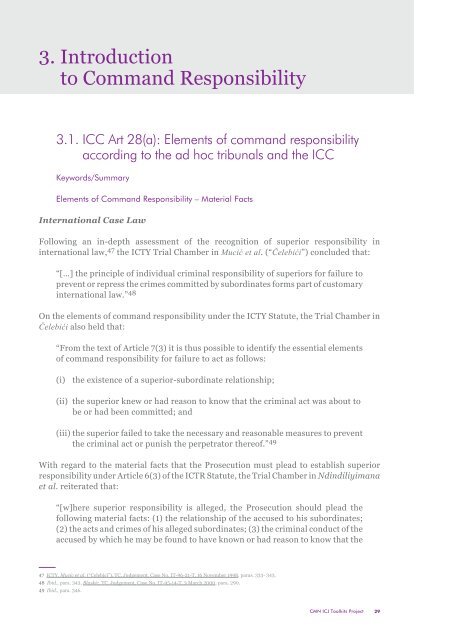Command Responsibility
CMN_ICL_Guidelines_Command_Responsibility_En
CMN_ICL_Guidelines_Command_Responsibility_En
You also want an ePaper? Increase the reach of your titles
YUMPU automatically turns print PDFs into web optimized ePapers that Google loves.
3. Introduction<br />
to <strong>Command</strong> <strong>Responsibility</strong><br />
3.1. ICC Art 28(a): Elements of command responsibility<br />
according to the ad hoc tribunals and the ICC<br />
Keywords/Summary<br />
Elements of <strong>Command</strong> <strong>Responsibility</strong> – Material Facts<br />
International Case Law<br />
Following an in-depth assessment of the recognition of superior responsibility in<br />
international law, 47 the ICTY Trial Chamber in Mucić et al. (“Čelebići”) concluded that:<br />
“[…] the principle of individual criminal responsibility of superiors for failure to<br />
prevent or repress the crimes committed by subordinates forms part of customary<br />
international law.” 48<br />
On the elements of command responsibility under the ICTY Statute, the Trial Chamber in<br />
Čelebići also held that:<br />
“From the text of Article 7(3) it is thus possible to identify the essential elements<br />
of command responsibility for failure to act as follows:<br />
(i) the existence of a superior-subordinate relationship;<br />
(ii) the superior knew or had reason to know that the criminal act was about to<br />
be or had been committed; and<br />
(iii) the superior failed to take the necessary and reasonable measures to prevent<br />
the criminal act or punish the perpetrator thereof.” 49<br />
With regard to the material facts that the Prosecution must plead to establish superior<br />
responsibility under Article 6(3) of the ICTR Statute, the Trial Chamber in Ndindiliyimana<br />
et al. reiterated that:<br />
“[w]here superior responsibility is alleged, the Prosecution should plead the<br />
following material facts: (1) the relationship of the accused to his subordinates;<br />
(2) the acts and crimes of his alleged subordinates; (3) the criminal conduct of the<br />
accused by which he may be found to have known or had reason to know that the<br />
47 ICTY, Mucic et al. (“Celebici”), TC, Judgement, Case No. IT-96-21-T, 16 November 1998, paras. 333- 343.<br />
48 Ibid., para. 343, Blaskic, TC, Judgement, Case No. IT-95-14-T, 3 March 2000, para. 290.<br />
49 Ibid., para. 346.<br />
CMN ICJ Toolkits Project 29


